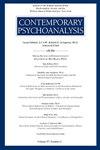On Getting Old
IF 0.2
4区 心理学
Q4 PSYCHIATRY
引用次数: 0
Abstract
Getting old, being sick, dying—all these normalities of life—have been badly misjudged as something of a mistake, a misfortune, an umglick, a fault, a lapse. Somehow, we have been lulled and fooled into thinking that we are supposed to be above such things as aging. Our social system has it that there be no disorder, no distress, no difficulty that we cannot quickly cure with the right drug, or surgical intervention, the right bumper sticker, or new therapy. There must be many reasons for such social silliness, for such blatant disregard of the ways of nature. Let us try to begin to think about how it is that we humans are not supposed to have been made of organic life-stuff. All organic life-stuff, we know, ages and eventually dies. All organic life-stuff, we know, suffers disorder and occasional unrest in its very clinging to life. There is no such thing as an untroubled life without misfortune of one kind or another, as we know. And yet, we have been collectively and foolishly convinced that such difficulty is an aberration, a sign of failure, an error to be corrected. But, perhaps even more true, is that we “simply” may not want to die, or to get sick, or to get old—or to think about it. I believe that (a) the myth of eternal youth is one aspect of our delusion. I suppose because we (Western industrial society) are still a very young culture, we may not yet be ready to think about getting old. Also, (b) we believe anything is possible. The clock can be turned back not only from Daylight Savings Time but also from aging and dying. Because we can erase wrinkles, perhaps we can erase the underlying condition as well. We can do and be and have anything we want. We want to be a girl? So be it. We want to make babies and can’t? We can. We want to fly like the birds? Yes. We want to live forever? Fine. In our modern world, limits cannot be taken seriously. Wish fulfillment takes its place, and not just in dreams, but as a论变老
变老、生病、死亡——所有这些生活的常态——都被严重误判为一个错误、一种不幸、一种失误、一种过失。不知怎的,我们被欺骗了,以为我们应该超越衰老。我们的社会制度规定,没有我们无法用正确的药物、手术干预、正确的保险杠贴纸或新疗法快速治愈的障碍、痛苦和困难。如此愚蠢的社会行为,如此公然无视自然的方式,肯定有很多原因。让我们试着开始思考,我们人类不应该是由有机生命物质组成的。我们知道,所有有机生命的东西都会衰老并最终死亡。我们知道,所有有机的生命物质在其对生命的执着中都会遭受混乱和偶尔的动荡。正如我们所知,没有这样或那样的不幸,就没有无忧无虑的生活。然而,我们集体愚蠢地相信,这种困难是一种失常,是失败的标志,是一个需要纠正的错误。但是,也许更真实的是,我们“只是”可能不想死、不想生病、不想变老——或者不想去想它。我相信(a)青春永驻的神话是我们妄想的一个方面。我想,因为我们(西方工业社会)还是一个非常年轻的文化,我们可能还没有准备好考虑变老。此外,(b)我们相信一切皆有可能。时钟不仅可以从夏令时开始倒转,还可以从衰老和死亡开始倒转。因为我们可以消除皱纹,也许我们也可以消除潜在的疾病。我们可以做任何我们想做的事,可以成为任何我们想拥有的人。我们想成为一个女孩?那就这样吧。我们想生孩子却不能?我们可以。我们想像鸟儿一样飞翔吗?对我们想永生吗?好的在我们的现代世界里,极限是不能被认真对待的。愿望的实现占据了它的位置,不仅仅是在梦中,而是作为
本文章由计算机程序翻译,如有差异,请以英文原文为准。
求助全文
约1分钟内获得全文
求助全文

 求助内容:
求助内容: 应助结果提醒方式:
应助结果提醒方式:


